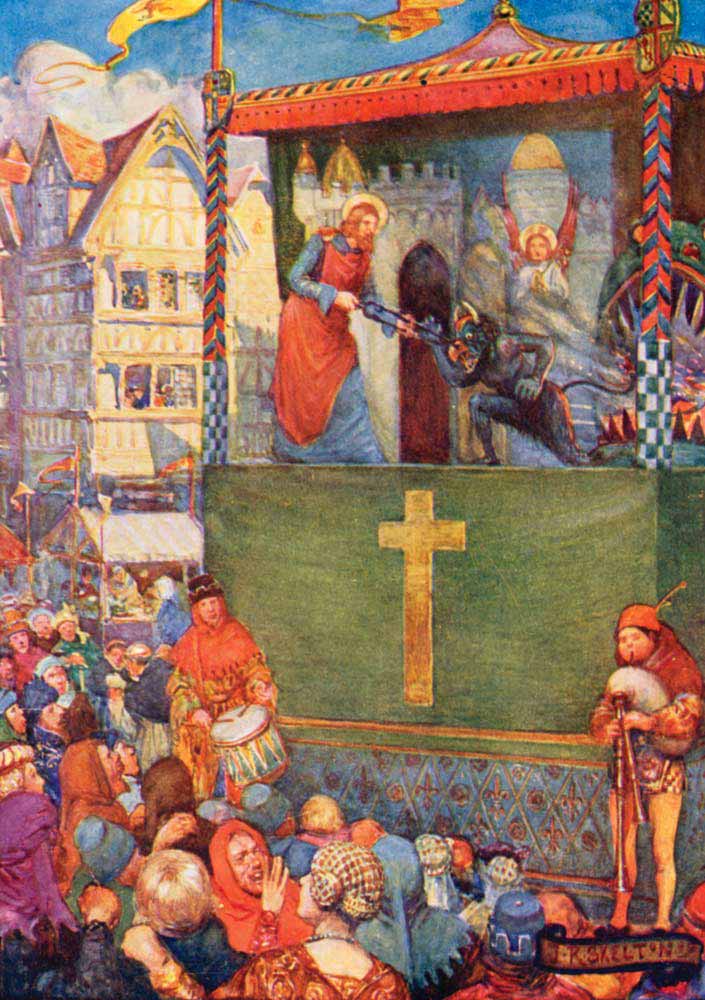
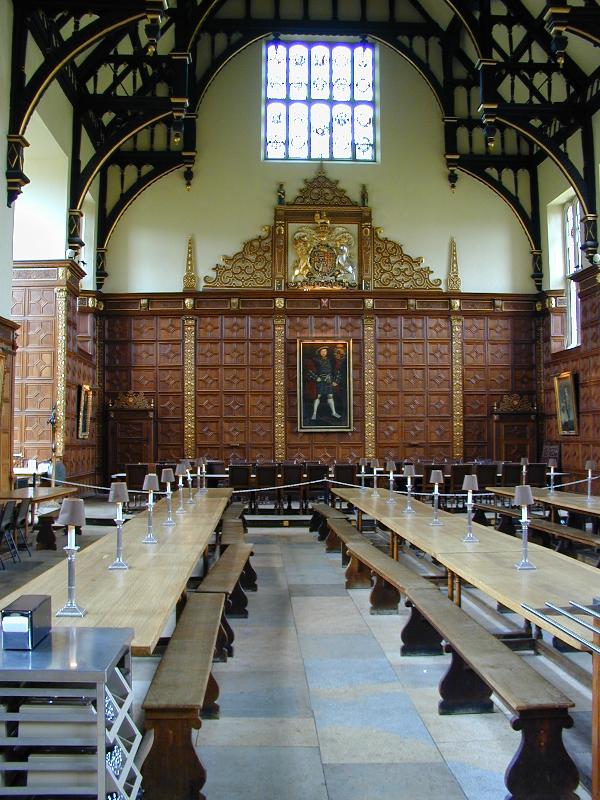
Theater before Shakespeare
In the Middle Ages, drama
was mainly church-centered, Mystery Plays
performed by citizens in the streets. Then came the
Morality Plays, before grammar school
students began to act versions of Comedies
by Plautus and Terence, then of Tragedies
by Seneca and Euripides.in college
halls or great lords' houses. Then Shakespeare
developed a form of tragedy inspired by the Boethian
idea of Fortune's ever-turning wheel,
expressed before him in the Mirror for
Magistrates etc, and found in Chaucer,
the themes of the Fall of Princes.
 |
 |
William
Shakespeare
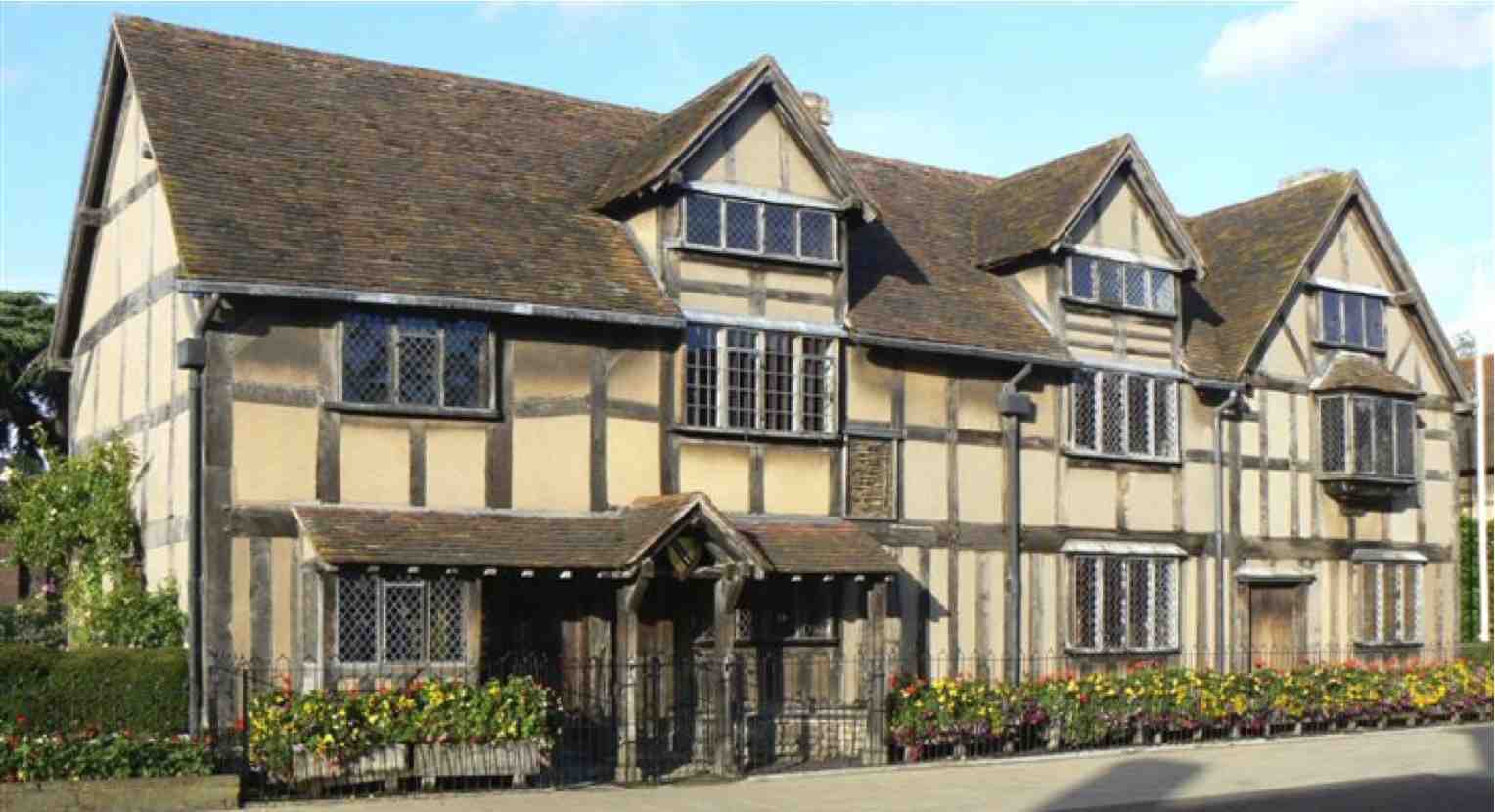 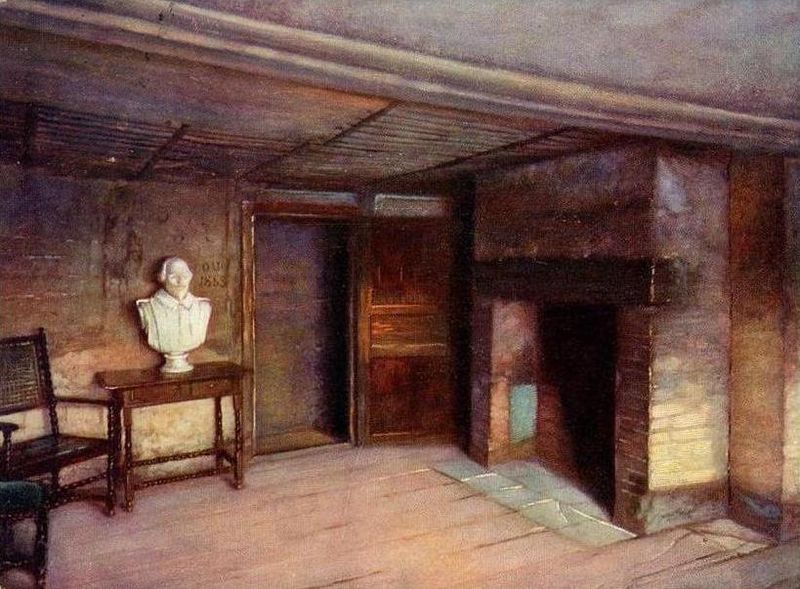 |
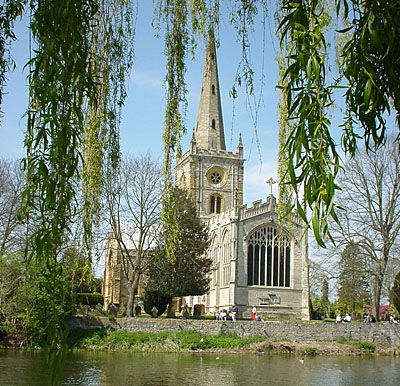 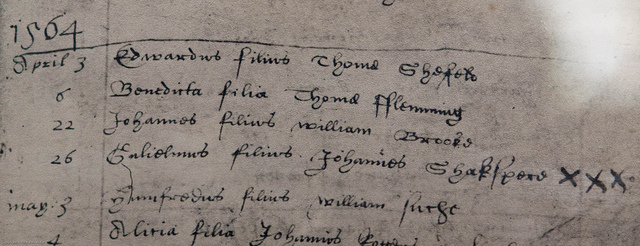 |
William Shakespeare (1564 - 1616) was baptized, according to
the parish register of Holy Trinity Church,
Stratford-upon-Avon, on April 26, 1564. His birthday has been
traditionally celebrated on April 23, St George's Day,
although there is no documentary basis for this. Seven
brothers and sisters were baptized in the same church, of whom
three died in childhood. The youngest, Edmund Shakespeare,
born in 1580, became an actor in London and was buried in
Southwark Cathedral in 1607.
Stratford was an important market centre, with a
population of nearly two thousand inhabitants. Shakespeare's
father was John Shakespeare, his mother Mary was a member of
the Arden family on whose estates John Shakespeare's father
had worked. John Shakespeare was living in Stratford by 1552,
with a business making gloves and curing leather; he also
dealt in wool. His house in Henley Street, Stratford, can
still be seen; it is known as the Birthplace, since William
Shakespeare is thought to have been born there. In 1568 John
Shakespeare was high bailiff (mayor) of the town, but he seems
to have had hard times in the late 1580s and early 1590s. He
died in 1601.
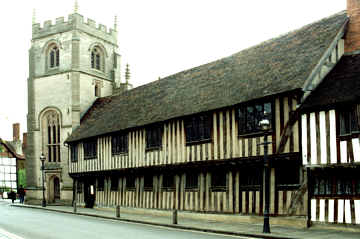 |
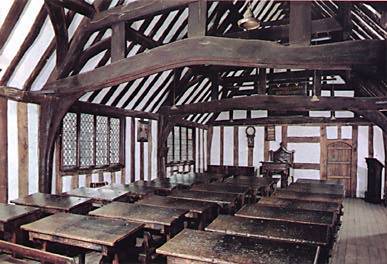 |
There was a grammar school in Stratford, the
King's New School, where William probably studied free of
charge for a number of years, mostly mastering Latin grammar,
literature and history. The school-room can still be seen.
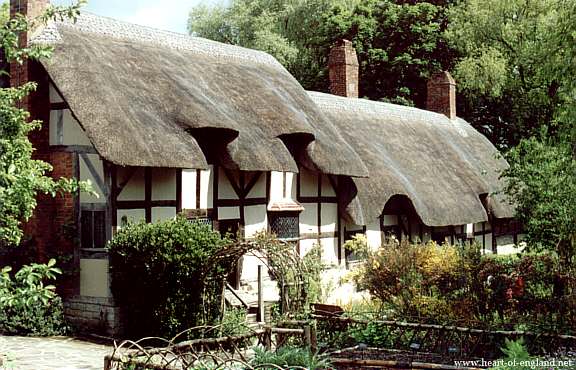
Late in 1582, in his 19th year, William was given permission
to marry a local girl, Anne Hathaway, then aged 26, without
the usual three weeks' delay, by a special bishop's bond. On
May 26, 1583, their first daughter Susanna was baptized. On
February 2, 1585 his twins Hamnet (his only son, who died in
1596) and Judith were baptized, receiving the names of close
friends of the family.
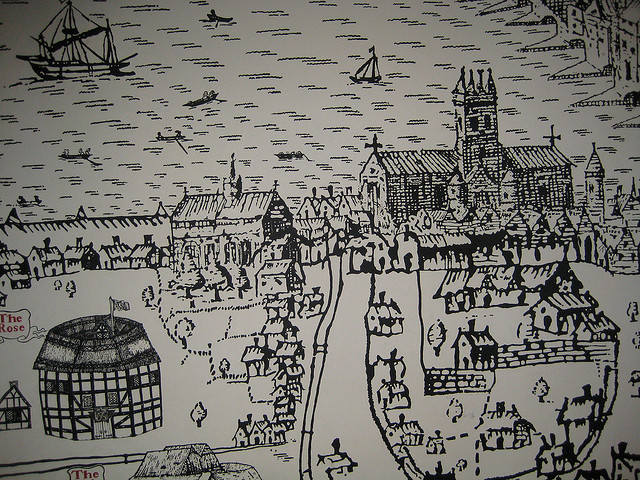 |
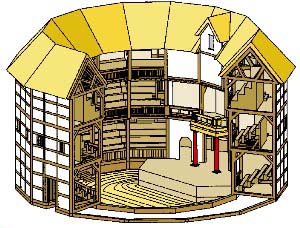 |
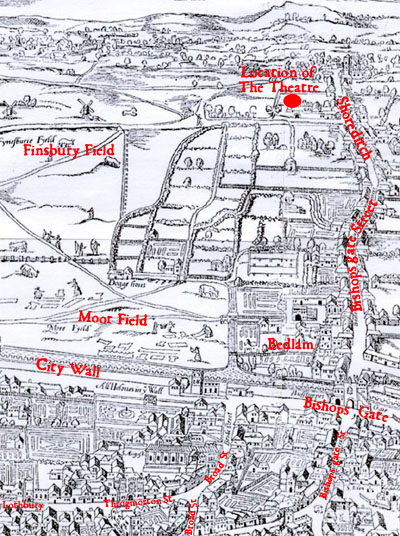
In 1598 we know that Shakespeare acted in Ben Jonson's Every Man in His Humour,
and in 1603 in his Sejanus,
but on the whole he was not famous as an actor. He is said to
have played the role of Hamlet's father's ghost.
The company was first called the 'Lord
Chamberlain's Men' in 1597, when George, Lord Hunsdon
received that title. At first they were known as 'Lord
Hunsdon's men'. At the end of 1596, they presented all six of
the Christmas plays at court and they, together with
Henslowe's Admiral's Men, were the leading actors of
the London theatrical scene, especially after a play presented
by Pembroke's Men at the Swan early in 1597, The Isle
of Dogs, brought about the arrest of Ben Jonson and the
suppression of that company.
When the lease on the land where the Theatre
stood expired in April 1597, two months after the death of
James Burbage, the Chamberlain's Men could not renew it. So on
28 December, 1598, they secretly tore down the building and
carried the main beams across the Thames to use in building
the Globe. At this time, when money must have been a problem,
the main actors including Shakespeare made themselves into a
company, each one of the shareholders being part-owner.
Shakespeare's share gave him ten percent of any profits they
made.
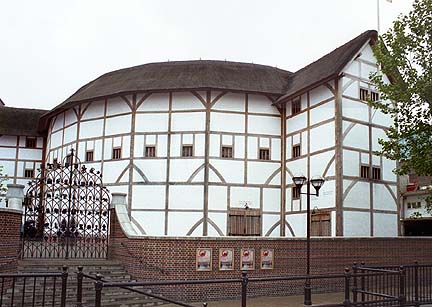 |
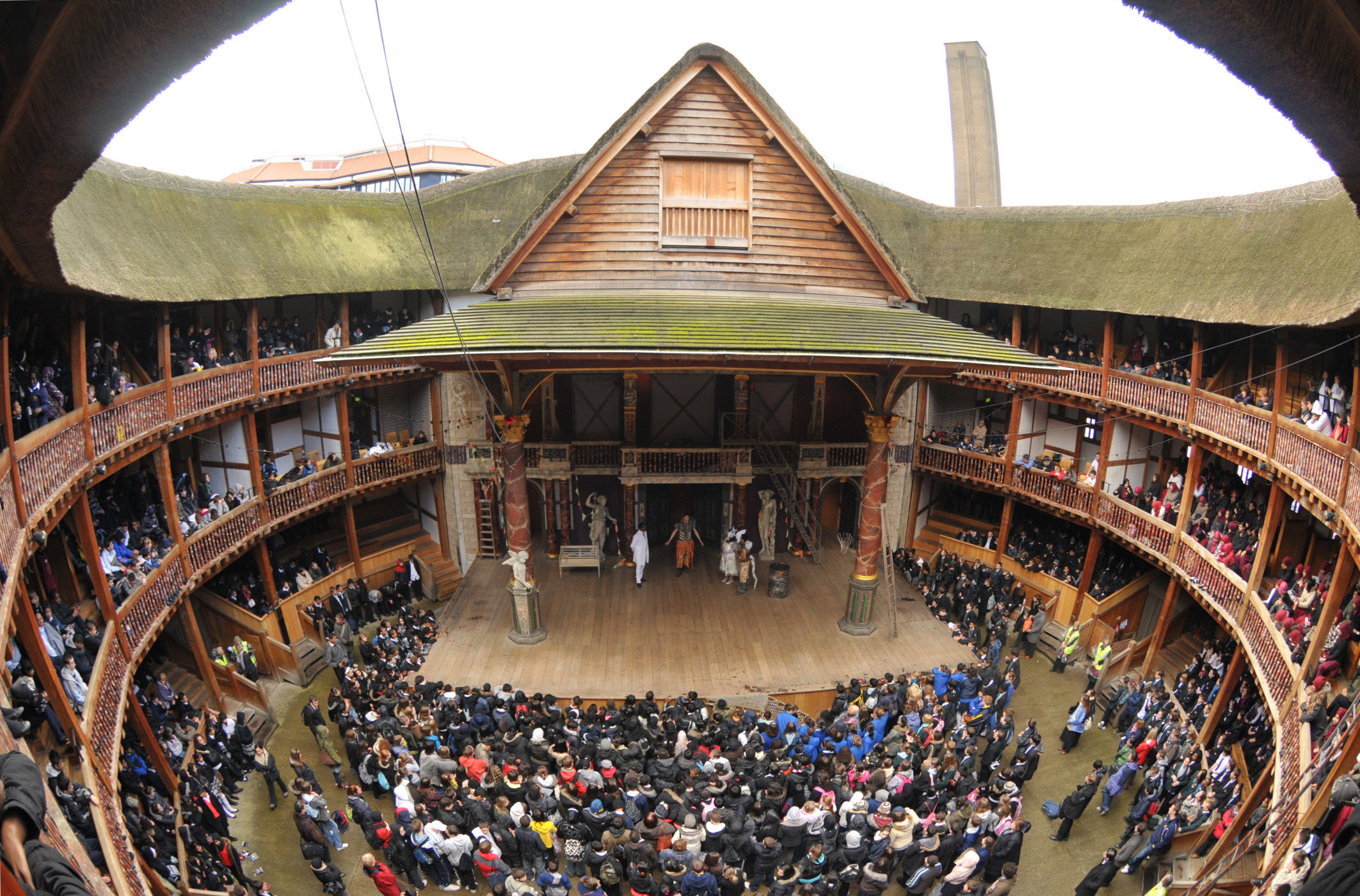 |
Nothing is known of Shakespeare's family life;
there is no sign that his wife or daughters came to live with
him in London, where he stayed in houses close to the Theatre,
then to the Globe. By 1597, Shakespeare had made enough money
to buy the second largest house in Stratford, the Great House
in New Place; this house was torn down by its 18th century
owner, who hated tourists! He also bought farm land and
another smaller house later; from 1597 his family seems to
have been living in New Place, and he also made investments
locally.
One major change in the actors Shakespeare was
writing his plays for occurred in 1599-1600 when the clown
Will Kempe left the company, perhaps after some kind of row
about his old-fashioned style of clowning; in his place came
Robert Armin, who seems to have been a more refined comedian
with a fine singing voice.
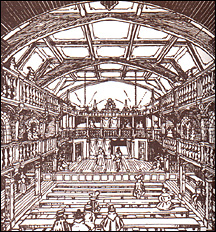
When King James became king in 1603, he quickly
made Shakespeare's company into The King's Men. When James
entered London for his coronation in 1604, Shakespeare and
eight other members of the company were in the procession,
wearing the king's livery. By 1609, the King's Men were using
the hall of the old Blackfriars monastery, an independent area
to the west of the City, as their main playhouse; it gave
greater intimacy to plays designed, perhaps, for a more select
audience. Certainly entry cost more. Also in 1609,
Shakespeare's 154 Sonnets were published in a quarto volume by
Thomas Thorpe.
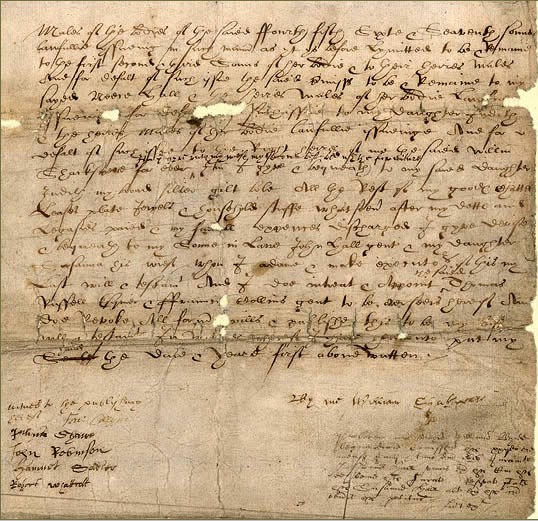
It seems that Shakespeare retired from London to
live in Stratford in about 1611, after writing The Tempest and
parts of Henry VIII.
In January 1615 (or 1616?) he made his will, leaving most of
his land to his favourite daughter Susanna, who had married
John Hall of Stratford in 1607 and had one daughter,
Elizabeth. His other daughter, Judith, only married in 1616.
She received only a little in the will, since Shakespeare
tried to transmit all his land as a complete estate to his
grandsons; after he died Judith had three sons, but all died
young and the family line ceased, since Elizabeth Hall had no
children.
The only mention of Shakespeare's wife in the
will, "I give unto my wife my second best bed with the
furniture," has been much discussed. It may be that his widow
had automatic rights during her lifetime to a third of her
dead husband's estate. After Judith married, some changes were
made to the will on 25 March 1616, and here Shakespeare's
signature is very shaky. Less than a month later he died, on
April 23, 1616, and was buried on April 25 inside the parish
church, near the altar, in a place of honor because he was one
of the churchwardens of the parish. Directly over the coffin a
stone was laid with the words:
Good frend for Jesus sake forbeare
To digg the dust encloased heare.
Blese be the man that spares these stones
And curst be he that moves my bones
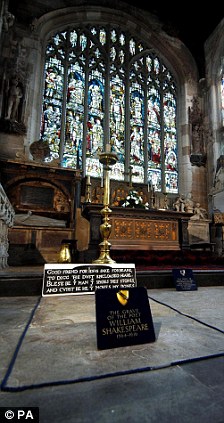

This request seems to have been respected, the
stone is still in place. A few years later a fine monument was
set up on the wall of the church near the grave, offering the
first portrait of Shakespeare that we have. His hand is
holding a quill pen, showing that he is being celebrated as a
writer. The Dutchman who made the statue, Gheerart Janssen,
had a shop in Southwark near the Globe, so he perhaps knew
Shakespeare personally.
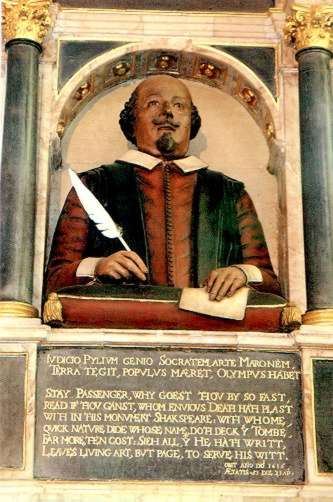
In 1623 his colleagues of the King's Men, John
Heminges and Henry Condell, with others, brought out a
complete edition of Shakespeare's plays in folio size, the
so-called First Folio containing 36 plays (not Pericles or the
poems). Further editions in folio form followed in 1632, 1664,
1685. In his lifetime 19 of the plays had been published
separately, in small quarto volumes, some twelve of them
offered as official versions ("good quartos"), the others
published without permission and in some cases representing a
very different version from that found in the Folios ("bad
quartos"). The plays in the First Folio seem to have been very
carefully prepared for printing from the best possible copies
available at that time; the big question, about which there is
much debate, is how much the plays had been revised by
Shakespeare or others over the years.
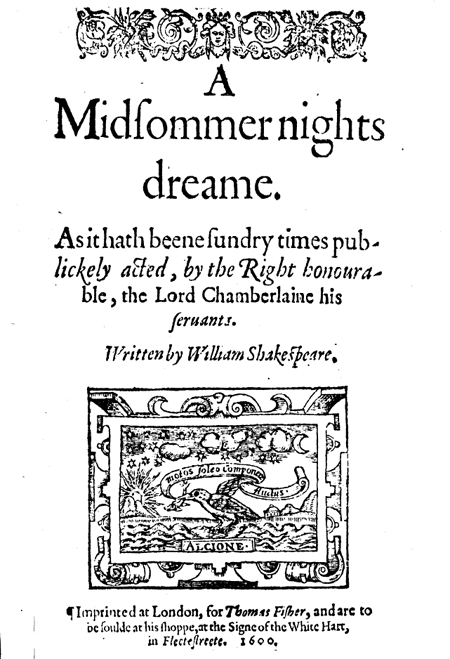 |
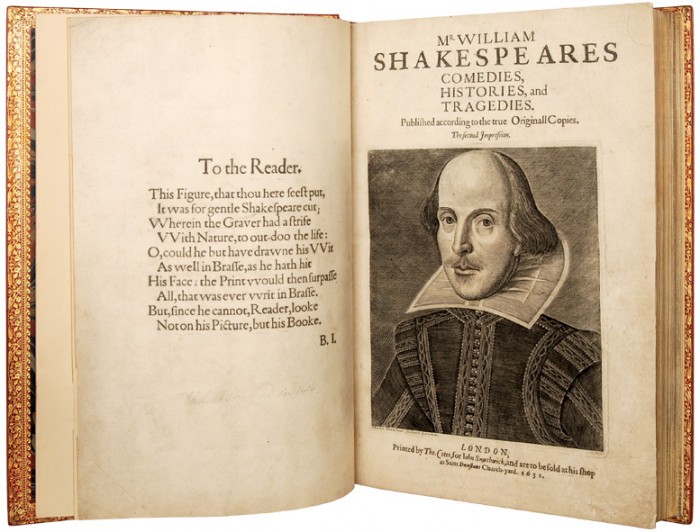 |
Hamlet's soliloquy
To be, or not to be, that is the question:
Whether 'tis nobler in the mind to suffer
The slings and arrows of outrageous fortune,
Or to take arms against a sea of troubles
And by opposing end them. To die--to sleep,
No more; and by a sleep to say we end
The heart-ache and the thousand natural shocks
That flesh is heir to: 'tis a consummation
Devoutly to be wish'd. To die, to sleep;
To sleep, perchance to dream--ay, there's the rub:
For in that sleep of death what dreams may come,
When we have shuffled off this mortal coil,
Must give us pause--there's the respect
That makes calamity of so long life.
For who would bear the whips and scorns of time,
Th'oppressor's wrong, the proud man's contumely,
The pangs of dispriz'd love, the law's delay,
The insolence of office, and the spurns
That patient merit of th'unworthy takes,
When he himself might his quietus make
With a bare bodkin? Who would fardels bear,
To grunt and sweat under a weary life,
But that the dread of something after death,
The undiscover'd country, from whose bourn
No traveller returns, puzzles the will,
And makes us rather bear those ills we have
Than fly to others that we know not of?
Thus conscience does make cowards of us all,
And thus the native hue of resolution
Is sicklied o'er with the pale cast of thought,
And enterprises of great pitch and moment
With this regard their currents turn awry
And lose the name of action... (Act III.i)
It is often said that in this speech Hamlet is thinking of
committing suicide, that the question is whether to go on
living or not. On the contrary, he is reflecting on the kind
of life he cannot avoid living because suicide is not a
possibility. The "question" of the first line is a "topic for
discussion" in an academic disputation at university. The
words "to be or not to be" are the familiar abbreviation of a
popular debate topic: "even when there is pain, it is better
to be alive (though unhappy) than not to be alive." The stress
on the impossibility of suicide, or of any easy way out, leads
to the conclusion that we have to waste a lot of time and
energy thinking (conscience) because there seems to be nothing
we can do! The university dispute was always inconclusive,
there was never a single right answer to the question/topic
proposed.